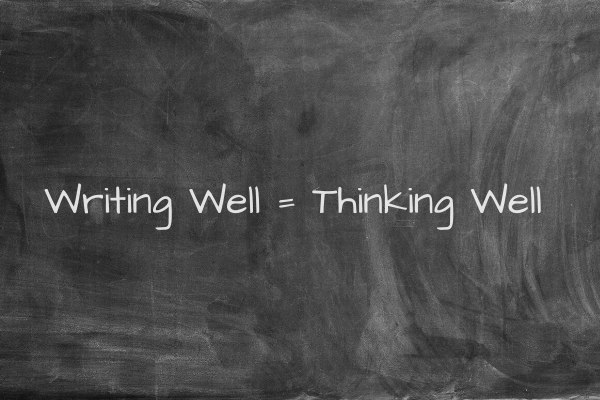After returning from reading week, all my classmates were anxious to go to our Canadian fiction class. It had now been over a week since we wrote our in-class essay and were now waiting to see what our grades were. Before class, everyone had been half-joking in the hallway that they wondered whether they had failed the essay.
But as the professor walked in, and everyone was now seated, the class went silent. The professor took out a stack of white sheets and laid them on the front desk. The midterms had returned. You could feel the anxiety in the room as all of us stared at the stack and awaited to hear what grammatical mistakes and structural errors we had committed. But then our professor took out a piece of white chalk and turned her back to the class to write on the chalkboard this phrase: Writing Well = Thinking Well. She then turned back to the class, and told us that how well we think will always depend on how well we write.
The reason why I tell this story is because I believe my professor’s lesson is an invaluable one for all students trying to become writers. We must understand that writing is not a job that we only do for grades, but rather a tool that helps us clarify our ideas.
Seeing writing as a tool that helps us gain clarity first means we must understand that our ideas and thinking are not understandable without writing. This false belief stems from how writing and thinking are often separated in classrooms. In a full-semester university class, students will often only write for a week before an essay is due. Besides this time, our semesters are spent only reading and attending lectures. To help bridge this gap between writing and thinking, I would like to propose two practical tips that have helped me as a student:
1. Enroll in a Writing-Intensive Course
While some other students may think I’m crazy for advising them to write even more when they are already burdened with assignments and readings, I have found over this past year that writing-intensive courses, like my senior thesis, have pushed me to constantly write as I research. I believe this type of experience is unique because, due to the large amount of writing and revising, my senior thesis has forced me to see writing and thinking as no longer being two different entities.
2. Make Time for Writing
If you cannot fit a writing-intensive course into your course load, I would suggest you push yourself to write and revise more for your upcoming essays, even its tempting to wait until the last couple of days to write them. I have found that in order to make this possible, I work on my upcoming essays weeks in advance by doing little by little each day. One of my English professors gave me this advice and in organizing my time to make more time for my writing. I also find that doing a little bit each day also helps in stopping my own procrastination. I no longer see writing an essay as a stressful job I have to begin and complete within 24 hours, but rather a careful and thoughtful process.
Hopefully, these two tips will help you as much as they have helped me in becoming a better writer! By doing these, I hope that other students will also learn to enjoy writing and see it as a tool that pushes them further intellectually.
 Daniel Hutchings
Daniel Hutchings
Alpha Upsilon Eta Chapter
University of Toronto Scarborough, Toronto, ON







I just lost my whole eloquently written comment (lol), but basically I researched this subject for my capstone project. I agree with your tips and my conclusion was similar but I would reverse the order and submit that thinking well = writing well. Great blog post!